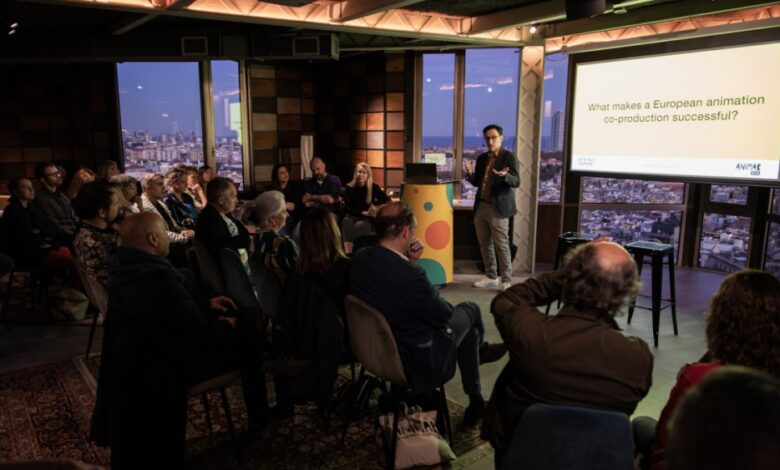European animation heavyweights debate AI, co-professionals, media regulations

Barcelona’s Animation BCN closed this afternoon after three days of working groups, roundtables and networking events focused on ways the region’s animation industry can weather a ‘global animation crisis’.
This year’s third edition brought together 90 delegates from 60 European industry associations in 24 countries to discuss the key themes and topics facing the animation industry today, including artificial intelligence, sustainable animation practices, media regulation and the benefits of co-production.
The assembled professionals, including producers, distributors, broadcasters, film fund organizers and government representatives, took part in a series of four focused working groups that drew several shared conclusions about the future of European animation.
Among those present were Lucia Recalde, Deputy Director and Head of the Audiovisual Industry and Media Support Programs Unit, DG Connect, European Commission; Patricia Hidalgo, Director of Children and Education at the BBC; and Edgar Garcia Casellas, director of ICEC, the cultural industry department of the Catalan government.
Conclusions of the working groups
1 – Strengthening media regulation
Citing the vast reach of free streaming platforms such as YouTube and TikTok, Animar participants agreed that greater child protection is needed on digital platforms. The working group recommends applying the Audiovisual Media Services Directive (AMVS) to all platforms that offer audiovisual content. The group also called for strengthening the definition of what constitutes a “European work” for quota purposes to better protect the retention of intellectual property within Europe as a means of supporting the long-term growth of the industry in the region.
2 – Promotion of European animation co-productions
“Faced with underfunded children’s programming and a global animation crisis,” Animar’s co-pro working group emphasized the need for better co-production tools and greater cooperation between financial institutions and broadcasters to support projects during the development phase. The unit also recommended creating better tax initiatives by linking the benefits to the retention of intellectual property by European companies and the relevance of the content in a European context. They suggested that this will strengthen the competitiveness of the European independent sector and avoid a future where most European animation companies focus exclusively on service work.
3 – Embracing ethical AI for a human-centric European animation industry
Participants in an AI-focused working group suggested that any European company planning to implement the technology into its operations would do so with a human-centric approach. Animation in Europe – a federation of animation producers from across the continent – further recommended developing a Best Practice Guide for the legal, ethical and sustainable use of AI tools. The group also called for greater access to training programs for established industry professionals to acquire knowledge and skills that align with the sector’s interests.
4 – Stimulate sustainability with common green production standards
Participants at an animation sustainability think tank highlighted the urgent need for common environmental sustainability tools to support European co-production efforts. In line with this commitment, attendees agreed to engage their national stakeholders in joining an existing international working group focused on creating standards for green animation production. This collaborative initiative aims to create a coherent approach to European sustainable animation practices.
Fulfilling previous commitments
Building on a recommendation from previous editions of Animar, Animation in Europe has collaborated with a consortium of European universities to launch Anima Mundi, the first academic, interdisciplinary and multi-stakeholder initiative focused on the European animation industry ecosystem.
The initiative will run from February 2025 to July 2028 and is supported by €4 million in funding from the European Commission through the Horizon Europe programme. The initiative aims to address key issues related to intellectual property, the distribution of European content and the promotion of cross-border collaborations.
In addition to connecting producers with key stakeholders, Animation in Europe has committed to creating a European animation brand, policy dashboard and toolkits designed to improve IP management and content discoverability.
Looking ahead
In the future, Animar BCN will launch a series of spin-off workshops dedicated to individual topics and hosted in various locations across the continent. The first will take place in March next year in Nova Gorica, Slovenia, where the conversation on sustainable practices in animation production and its application in Eastern European areas will continue.
Two more spin-offs are planned for the 2026 and 2027 editions of the Annecy Animation Film Festival, focusing on how to better promote the distribution and circulation of European animation titles worldwide.




